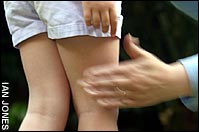Parents face up to five years' imprisonment if they leave a mark
Parents should be banned from inflicting even the mildest of smacks on their children because they often do it out of anger and "social stress" rather than as a "considered disciplinary measure", a report said yesterday.
The Commission on Families and the Wellbeing of Children, chaired by an eminent child psychiatrist, said smacking could escalate to "frank abuse" and it was wrong for children to have less legal protection than adults.
Parents face up to five years' imprisonment if they leave a mark
Under the law, mild smacking is allowed but parents who hit children hard enough to leave a mark face up to five years' imprisonment.
A "reasonable chastisement" defence is still available to parents but they can be charged with common assault if a smack causes bruises, grazes, scratches, minor swellings or cuts.
The Government suffered a rebellion by 47 Labour MPs who wanted a total ban on smacking when the measures were passed in the Children Act last November.
But the commission said: "The defence to a charge of common assault of reasonable chastisement by a parent should be abolished."
The commission was set up by the Government-funded National Family and Parenting Institute and the children's charity NCH, formerly the National Children's Homes, which receives most of its income from the Government.
It is funded, however, by the Joseph Rowntree Foundation, an independent charity.
Prof Sir Michael Rutter, who chairs the commission, said: "Although most parents who use physical discipline do not abuse their children, research has shown that children in families where physical discipline is used extensively are more likely. . . to be physically abused."
The report cited research showing a link between families with a culture of violence "including the regular use of physical punishment" and "incidence of physical abuse".
It said the evidence pointed to physical abuse arising in response to "anger, emotional and social stress and family relationship problems - often as an expression of parental rejection or hostility".
Parents who hit their children often did so as a way of dealing with their own anger and frustration.
On whether smacking was effective, the report said: "Corporal punishment as with other forms of discipline can secure compliance with parental demands. However, there is evidence of some link with behaviour problems including aggression and anti-social behaviour in the longer term."
The report said under-12s should never be held responsible for their crimes, no matter how serious.
The law states that children under 10 cannot commit crimes because they are too young to weigh up what is right and wrong and to deliberately break the law.
But research by the Royal College of Psychiatrists, used by the commission, said a child's understanding of crime may not be fully developed until their late teens, even though a "degree of maturation" was achieved by 14.
Sir Michael said there needed to be a clear distinction between where the child's responsibility ended and the parent's began. Although it was fair to say there was overlap, there needed to be a "cut-off" age to mark out responsibility in a court of law.
He said the age of criminal responsibility should be increased to 12 but added that doli incapax - a presumption of innocence - should be reintroduced up to the age of 16 to allow for the "highly variable process of moral development in children".
Critics said this meant half a million burglars and drug dealers would only rarely be brought before the courts.
But Sir Michael stressed: "We are not saying people should not be brought before the courts but that it should be done with the proper recognition of the immaturity of kids as young as 10.
"Nor are we saying that children should be let off but [we are] asking 'does the child know what he has done is wrong and have the ability to see consequences?'."
The commission called for the Government to issue clear guidelines on the age when children could be left by themselves and the minimum age at which a child could act as a babysitter.
Publishers wishing to reproduce photographs on this page should phone 44 (0) 207 538 7505 or e-mail syndication@telegraph.co.uk
